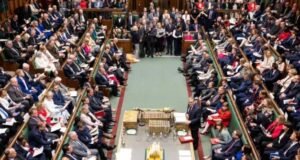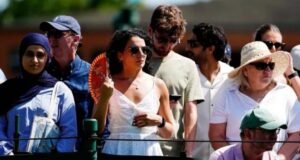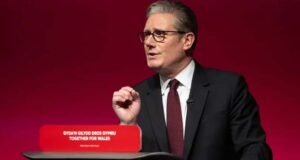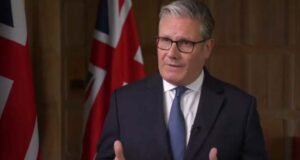 David Cameron’s mother gave him a £200,000 gift after his father’s death which could potentially
David Cameron’s mother gave him a £200,000 gift after his father’s death which could potentially
avoid inheritance tax, his accounts show.
In a first for a UK prime minister, Mr Cameron has released a summary of his tax returns from 2009-
15 as he tries to defuse a row over his finances.
The two £100,000 payments were made a year after the PM inherited £300,000 from his father in
2010, papers show.
Ministers said he’d done nothing wrong but Labour said questions remained.
PM sets up anti-tax dodging task force
Over six years, Mr Cameron earned a total of almost £1.1m and paid about £400,000 in income tax,
according to the three-page summary.
‘See the papers’
Last year, he paid almost £76,000 in tax on an income of more than £200,000. Those earnings
included almost £47,000 from a share of rent paid on his family home in west London.
The payments by Mary Cameron to her son in May and July 2011 were given tax free, and will only
become liable to inheritance tax of up to 40% if she dies within seven years of handing over the
money.
Downing Street said the payments were an attempt to “balance” the sums received by all Cameron
children, as Mr Cameron’s older brother had inherited the family home.
But Labour leader Jeremy Corbyn said Mr Cameron needed to publish his full tax returns dating back
to before he became prime minister in 2010, when he sold off shares in his late father’s offshore
investment fund for a £9,500 profit, below the £10,100 threshold for capital gains tax.
“I want to see the papers,” Mr Corbyn told the Andrew Marr show.
“We need to know what he’s actually returned as a tax return. We need to know why he put this
money overseas in the first place, and whether he made anything out of it or not before 2010 when
he became prime minister. These are questions that he must answer.”
‘System wrong’
Asked about the £200,000 gift from his mother, the Labour leader said there was “possibly” a case
for looking at inheritance tax rules.
He said: “It does actually reduce the level of inheritance tax that is available for the Exchequer as a
whole.”
Shadow chancellor John McDonnell said the prime minister had “effectively inherited £500,000 from
his mum and dad and not paid a penny on it,” which, he said, showed there was “something wrong
with the system”.
Mr Corbyn, who has promised to publish his own tax returns “very soon”, also suggested Britain
needed to be “much more assertive” on the question of overseas arrangements in the UK’s overseas
territories and asked why Britain was “encouraging” tax havens.
And he said greater openness around tax affairs might be expected from all those in public life, not
just MPs, in future, saying: “I think we’re moving in that direction”.
The SNP are, meanwhile, calling on Mr Cameron to publish a financial statement on all government
ministers and whether they have benefited from offshore tax havens.
Energy and climate change secretary Amber Rudd defended the prime minister on the Andrew Marr
show, saying the prime minister had “said all there is to be said” about his tax affairs, having taken
the “unprecedented step” of publishing details.
‘Blame me’
She said Mr Cameron and his family had done nothing wrong and had paid the correct amount of tax
due, adding that going after tax havens had been a “key priority” for the government since 2010.
Mr Cameron has also announced a new task force to investigate tax-dodging allegations arising from
the leak of 11 million documents from Panamanian law firm Mossack Fonseca, known as the Panama
Papers.
The prime minister was dragged into the controversy when it emerged his late father’s investment
fund, Blairmore, was a client of the firm.
Downing Street issued a series of statements over four days as pressure on Mr Cameron mounted
before he finally admitted he had benefited from the fund.
On Saturday, he admitted he could have better handled the row over his financial affairs, telling
people to “blame me” for the slow response, not Downing Street officials.
He said he was publishing the information on his income to be “completely open and transparent”.
The figures released by the prime minister also show:
He and his wife Samantha made a £19,000 profit from the sale in 2010 of their shares in the
Blairmore Holdings fund
Mr Cameron declared a £9,501 share of that profit, below the then £10,100 capital gains tax
threshold
On top of his prime ministerial income, and the London rent, he last year received £9,834 in taxable
expenses from the Tory party and £3,052 in interest on savings at a High Street bank
He earned enough to benefit from the 2013 cut in the top rate of tax from 50p to 45p (for people
earning more than £150,000)
In 2010 when he first entered Downing Street, he took the prime ministerial expenses deduction – a
£20,000 tax-free allowance – as part of his £142,500 salary
But he voluntarily cancelled out the allowance by declaring the equivalent amount as taxable income
from 2011-12, 2012-13 and 2013-14, before waiving it from 2014-15
Mr Cameron’s tax schedule from RNS Chartered Accountants also showed:
As leader of the Opposition in 2009-10, Mr Cameron paid £43,483 in tax on £129,225 income
After entering Downing Street for the year 2010-11, he paid £56,155 on a taxable income of
£157,286
In 2011-12 his income rose to £200,919, boosted by his share of rent from the Camerons’ Notting
Hill home, and he paid £77,987 in tax
In 2012-13, he paid £72,472 tax on an income of £189,506; in 2013-14 he paid £76,288 on a
£200,735 income
The prime minister’s salary was steady at £142,500 from 2010 to 2015, but there were tax variations
due to treatment of his pension contributions and the different approaches to his £20,000 tax-free
allowance.
In terms of rent earned on the Notting Hill house, Mr Cameron’s 50% share, minus expenses, was
£45,041 in 2011-12, £46,700 in 2012-13, £47,764 in 2013-14 and £46,899 last year.
The new tax task force announced by Mr Cameron will have initial funding of £10m and involve staff
from the Serious Fraud Office and Financial Conduct Authority as well as HMRC and the NCA.
The government said the agencies had leading technology, experts and resources to tackle money
laundering and tax evasion.
Shadow chancellor John McDonnell said proposals for the task force to report to the chancellor and
home secretary were “unacceptable”.
“Any inquiry must be fully independent and in public,” he said.
 Weekly Bangla Mirror | Bangla Mirror, Bangladeshi news in UK, bangla mirror news
Weekly Bangla Mirror | Bangla Mirror, Bangladeshi news in UK, bangla mirror news







